#tolkien gateway
Explore tagged Tumblr posts
Text

hi turins resume on the gateway is fucking insane
652 notes
·
View notes
Text
If you aren't familiar, Tolkien Gateway is one of two excellent wiki sources for Tolkien/Lord of the Rings information.
There is also The One Wiki To Rule Them All, aka The Lord of the Rings wiki. Both are quite useful and well-sourced, and if you're looking up something more than just the basics it would behoove you to use to both.
Per usual, the answer will be posted in the results post after the poll ends, along with the rankings for the other 11 pages. If you look up the answer before then, please refrain from posting it in the notes. :)
ETA: As far as I know, the calculation of a page's length in bytes is based on its source code. So, any images or other files would be represented as URLs and perhaps some text specifying a size or border. So, they do contribute somewhat to a page's length, but not an oversized amount.
248 notes
·
View notes
Text
If he's your boyfriend, then why is he replying to my comment about the Doriathrin dialect on Tolkien Gateway?
20 notes
·
View notes
Text
Am I the only one who absolutely hates the new layout of tolkiengateway? I appreciate the dark theme but my god, I can't find anything on there anymore, give me back clear divides between sections, give me back more differentiation between text... 😭
Sorry to whoever made it, I get the aesthetic, but I can't read it like this, it's such a struggle now 😩
Or am I being dumb? Is there any way to change the visual layout back or something? I couldn't find the option but hope dies last...
4 notes
·
View notes
Text
Over Old Hills and Far Away - Tolkien Gateway
0 notes
Text
okay opinions needed again
brought to you by me trying to write an innocuous line of fanfic about earendil and realizing that I don't think there's any official canon on this
#elros's article on Tolkien gateway kind of implies that he has all the same physical capacities as elrond and just decided that 500#was a nice round number to go out on#so theoretically if elrond can't have a beard elros can't either#however I think it would be HILARIOUS if that was the one (1) physical thing that changed or if he could just.#decide that he wanted one#other option being that they both can and elrond just doesn't want one
68 notes
·
View notes
Text
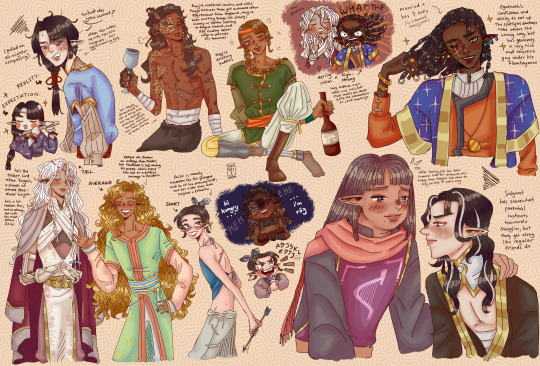
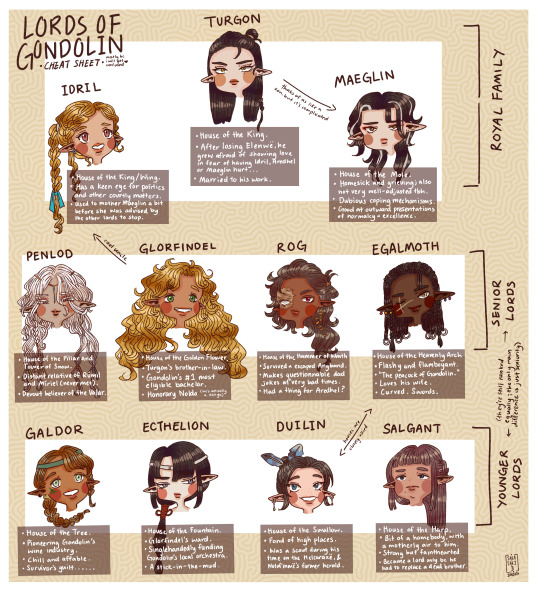
ive had vague concepts for the lords for gondolin floating around my noggin since late 2021, but never really sat down to get em drawn... so during my hiatus i figured i should stop sitting on it after 2917382 years 😴 tho mostly i just wanted to do another relationship chart bc the first three i made in june were! so!! fun!!!
let me know if the text is too hard to read... hopefully it wont be on desktop but ill see what i can do if need be 👍
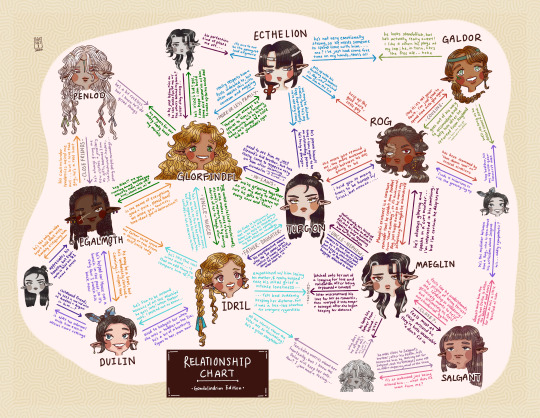
i had a lot of fun with these batch of concepts so below is an extra comic and a sketch page:
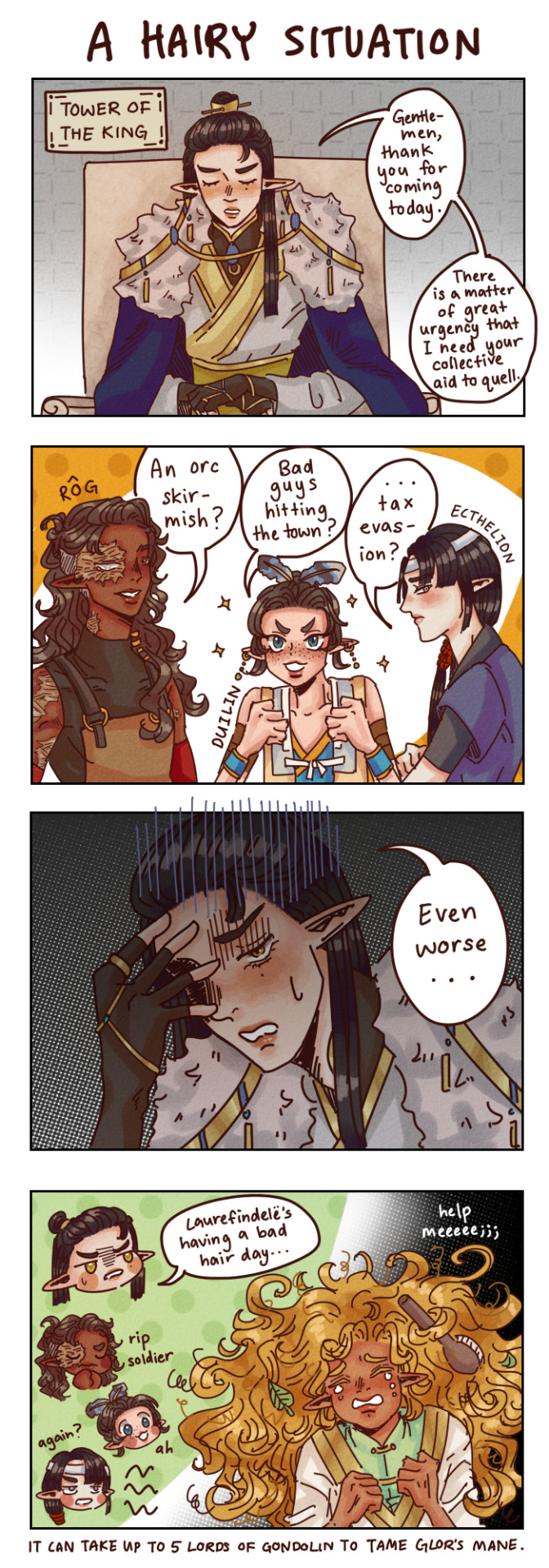
extra 2: just some bonus rough sketches of the lords' possible dynamics w/ others prior to the darkening?? i write fanfiction in my head 25 hours a day bc i forgot how to do so with actual stories HAHAHA
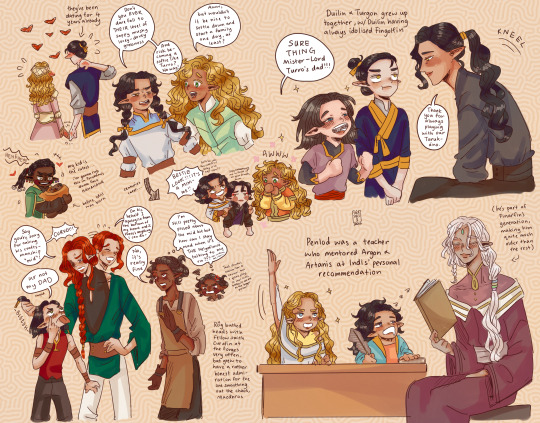
#silmarillion#maeglin#turgon#glorfindel#gondolin#ive tried to follow as much of the info on tolkien gateway as possible. but i didnt wanna design armour JUST yet HAHAH#i hope you wont mind the creative liberties hehe.... i also changed rogs design a lil.... his old hairstyle was bugging me#in terms of ages only penlod and egalmoth are older than turgon :DDD ecthelion is the youngest barring maeglin and idril!#and ofc it isnt a sketch dump if i dont find some obscure way to sneak maedhros into it 😗😗#idril#penlod#rog#egalmoth#galdor#ecthelion#duilin#salgant#curufin#aredhel#galadriel#argon#fingolfin#lords of gondolin#maedhros#noldor#silm#the silmarillion#the silmarillion fanart#silm art#elves
517 notes
·
View notes
Note
Seconding eotenas=yotun as the eo dipthong in older versions of English was pronounced "yo". Like: that word just reads literally as "yotenas", or "yotun" + a latinized plural ending, so its very clearly the Beowulf author trying to give a Christian explanation for pre-christian beliefs.
Another interesting, tho unrelated, bit of triva to this: Dr. Jackson Crawford, an Old Norse specialist, has frequently argued for understanding yotun less as a "giant" analogue(which in the Norse context would be more like Trolls) than as "anti-gods"; bscl a tribe of other divine beings opposed to the aesir. Tho I suppose, in that respect, you could make the argument that they're something like the giants from the Gigantomachy of Greek mythology.
As to orcneas, yeah, I have NEVER seen a convincing explanation for what that was supposed to mean, or even a confidently worded argument for what it could mean. Tolkien Gateway's page for Orcs has an Etymology section that I think Deals With The Subject Interestingly. It puts forward the argument that the association of orc with Orcus was a mistaken conflation from an 11th century glossary, tho later argues -along the Orcus line- that orcneas might mean "the dead of the underworld"(bscl: "Orcus-Corpses"), but I would say that doesn't make much sense as "Descendants of Cain". If -neas DOES mean corpses, tho, then perhaps maybe it could have been some novel formation(a kenning of somekind maybe??) for draugr/the undead? We'll probably never know definitively what the hell that word was referring to |:T
Hello! Love your ogre research, first of all. So something weird here, in my English translation of Ariosto the monster that threatens Angelica (the orca) is translated as “sea orc”, and the blind ogre who acts like Polyphemus (the orco) is translated as “land orc”. (And by extension “sea orc” evolved into a dragony thing in some modern fantasy books). Any idea why that happened instead of just calling them “orca” and “ogre” or something?
Ah yes the Orlando Furioso. I meant to include this in my big "What makes an ogre" series but never got the time.
So... I have to admit I am not an expert on Italian language, especially old fashioned Italian language, and I also am no expert on the full Orlando Furioso (it is a very complex work I only got started on recently). But here's the thing...
It is well-known that the Orlando Furioso was put together by taking elements of Greco-Roman mythology and reinventing them completely. The Orco and Orca are this. The Orco is basically Polyphemus reinvented - but here with two eyeballs made of bone instead of one eye promptly gouged out. The Orca meanwhile is the sea-dragon of the Andromeda story given a new name. So far so good.
But "Orca" is not meant to evoke the sea animal of the same name, the "killer whale", and that's something everybody has to remind people of (even the Wikipedia article for the Orca in Italian points out it is NOT the "orca" as in the sea creature). Orca is used here as the male form of "orco" - and the "orco" is indeed the same name of creature used by Basile to designate his proto-ogres. The "uercos", which is just "orcos" spelled differently.
So should we translated "Orco" as "ogre" and "Orca" as "ogress"? Well... No, it wouldn't work. At least for the Orco it can work since he sports typical ogre traits and DID influence the rise of the ogre figure in France (I don't think it is a random choice if madame d'Aulnoy's ogres are cyclops). But the Orca clearly isn't the same kind of creature - it is a sea dragon, or a sea monster, or some big sea snake. So this hints at the fact that "orco/orca" doesn't actually translated, in the context of the Orlando, as "ogre"...
You see, by Basile's Pentamerone, the "orco" is clearly an "ogre" in the fairytale sense of the word - though some English translators decided to go for "ghoul" because they didn't understand why an ogre would have magical powers, unaware that ogres were originally sorcerers/fairies of their own rights. They preferred to evoke the shapeshifting Arabian demons, allowing for an easier explanation of "Oh yes the ogre turns into all sorts of animals and curses people when it can't eat them".
[Note: As I write this I realized "orchi" is apparently the plural of "orco"? Well... I'll keep calling them "orcos" for now, but another proof I am not expert when it comes to these things]
But the author of the Orlando Furioso seems to have had a different and more ancient meaning in head for "orco". If you ask me, what seems very likely (though I am no expert) is that "orco"/"orca" is here taken as meaning "man-eating monster". Not just a fairytale ogre, but any kind of creature that wants to devour human beings. As a result the "orco" is an ogre-like giant, while the orca is a sea monster-dragon. "Orco/a" is used in the same broad sense as how "fairy" could be used in the British Isles to refer to all sorts of creatures, or yokai in Japan - or at least, that's what it seems to me. This is probably why the translator chose to prefer the term "orc", more neutral and evoking the older roots and mysterious figures behind the word "orc" before Tolkien made it famous. Calling the sea creature "orca" feeds the confusion with the killer whale ; while calling the land monster "ogre" might remove the idea that he is another form of the sea creature met earlier. One could keep the cohesion by having "ogre / ogress" but it would be mistranslating to call the sea monster "ogress" when it is clearly not just a female version of the land creature. So ultimately I think this is why the terms "sea orc" and "land orc" were chosen - it keeps the unity, while pointing out that the term does not designate a specific type of being, more a large class of man-eating beings. You could easily go with "sea monster" and "land monster" too.
At least that's how I perceive things - but again I am NO expert and any actual Italian insight on this topic would be more than welcome.
#adarkrainbow#et al#Eotenas#Yotun#Orcneas#Philology#Linguistics#Folklore Studies#Old English#Tolkien#reblog replies#zA Writes#zA's Exceedingly Amateurish Classicism#Our Staff#Tolkien Gateway
129 notes
·
View notes
Text
Idhrenor had been expecting a calm evening - the rain was a steady rhythm and the guard post was warm. He had been about to suggest to ask Tawenion and Conuieth if they would wish a turn at the post when there is a knock upon the gate and when Idhrenor had come to greet them he had found…naught of what he had expected.
There is a glimpse of a cart not far behind the…elf? Idhrenor supposes the figure is an elf - he is beautiful, for all the scars upon his face and his injured hand but his accent and speech - how did one come to speak the tongue of long fallen Gondolin - not the hybrid tongue that had come from the settlement at Sirion but the language of the hidden city that Idhrenor had heard from very few - the survivors of Gondolin who still lived spoke far differently now.
He is asking to be let in and Eru, can Idhrenor afford to - with Saurons rise and the fall of Eregion there are far too many risks to merely give refuge to strangers. And yet, yet he does not wish to leave those of good will out in the cold.
“Idhrenor, what tidings? Have you frozen in the cold to stand so still in it?”
Conuieth comes upon to him and Idhrenor breathes his relief - his commander knows better than he about such subtleties of The Enemy and how to detect them.
“A stranger asks for refuge for he and his friends - he speaks the tongue of Gondolin long fallen but an elf, I believe, though he has been scarred. I do not feel darkness upon them but you are better equipped than I to find such things”
“I too, do not feel darkness here but it is a strange thing, that they would come here.”
And then they see two sleeping mortal children. Very young, as Idhrenor knows such things - one perhaps hardly out of carrying wraps and that, that is what decides the matter for him.
“Let them through but take them to the empty guard quarters for now - I will go to Muiniel so she might inform those higher”
Muiniel is the one in charge of Idrenors unit overall and it is she who will know who to tell - Lindon is not heavily rigid in such things but there is a system to such matters and Idrenor admits he trembles at the thought of having to perhaps report to the High King. Even Herald Elrond, kind as he was had awed him - The High King had not formally filled his position after his Herald had been lost, though he kept a very efficient elf for such matters (Idhrenor did not like his fussiness but admitted that he had only seen it through the paperwork that filtered down) as needed a Herald.
It becomes stranger when the party enters. The elf? keeps to the shadows and Idhrenor hardly sees the others except as cloaked figures apart from the giant mortal carrying the two small ones who Idhrenor tries very hard not to gawk at (he has not met many mortals, certainly none so very tall) and takes them to the guard house where they may be safe and they may be guarded.
@plotdesigner @themalhambird @nocompromise-noregrets @self-destructinganimal @conundrumoftime @seagull-energy @kenobiwaned
#fic#au: golden cage#i hope i did okay on the names! (I need to rebuild my Tolkien Language Notebooks!)#they all have a whole backstory now obvs!#Idhrenor is only like 700 years old you guys! very new to all this!#(i used tolkien gateway and some other places)
10 notes
·
View notes
Text
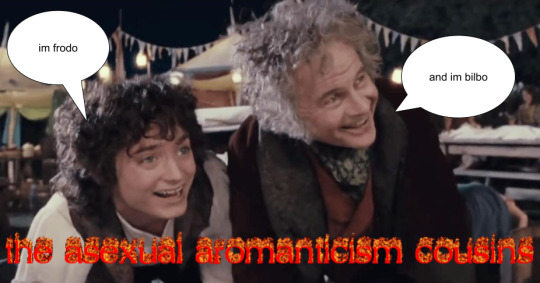
my headcanon
#i made this in google drawings. sorry that it looks... like that#i couldnt find a better image for this on tolkien's gateway so i used someone elses' screenshot. because god knows im not going thru all-#-that *again*#tolkien#bilbo baggins#frodo baggins#lotr#the hobbit
42 notes
·
View notes
Text

ok tolkien gateway go off queen
242 notes
·
View notes
Text
I am going to kill cloudflare
7 notes
·
View notes
Text
love from before still strong
For @tolkienfamilyweek Day 1 - Parent-child relationship
Maglor is shaking as he makes his way through the shadows. His hand is still in searing pain, even though the Silmaril is now at the bottom of the sea. He can see the horrified, startled face of the guard he killed, and the horrible blank emptiness on Maedhros’ face just before he pitched forward and--
He shudders, tries to put it out of his mind.
He needs to get to Elrond. There is no room for a plan or for thoughts of consequences, only for that singular goal.
There’s nothing else left, is the thing. Morgoth is defeated (no thanks to him), all his brothers are dead, the Silmarils are gone and it is probably for the best, and Elros is already gone with the Men from the Host, departed for their new Isle of Gift while Maglor was huddled in the woods trying to come to terms with still being alive.
There is, distantly, the lurking possibility in the back of his mind that that could change. He is trying very hard to not entertain that possibility. There is no good reason for him to be alive when all his brothers are dead, but the situation only becomes more senseless if he throws away the life that only he has been allowed to keep.
So here he is, slipping through the camp of the Host of the West that he fled from, sword dripping blood, only days ago.
Fortunately, he does have some idea where to go in search of Elrond, from when he was here before--not from anything he saw, but rather from where in the camp Gil-Galad was most eager to prevent him and Maedhros from passing. More than that, he knows his son, and it is no stretch of the imagination to suspect that he ought to check the healers’ tents first.
Sure enough, as he approaches the tent at the end of the row, he hears a familiar voice saying, “Is there anything else you need from me tonight, Annehtë?”
It’s Elrond, which is good, but he’s not alone, which could cause problems. Maglor draws close to the side of the tent, the better to listen for an opportunity, and to stay out of sight of anyone passing.
“No, you’ve done all you ought to and more,” says an elf-woman who is presumably Annehtë. Peering through a gap between tent panels, Maglor spots her, a blonde Vanyarin who is probably not that much younger than himself, but whose face bears less stress than any elf of Beleriand’s anymore and makes her look unwontedly young.
Elrond, in plain and serviceable healer’s robes, looking weary but otherwise no worse for wear, is moving towards the tent entrance. “Then I will bid you farewell till morning, for this day has me unusually weary.”
Before he can leave, though, Annehtë calls out, “If you will stay a moment, there is a matter I would speak with you on.”
Maglor stifles a curse, and Elrond looks no less irritated as he turns around--he’s hiding it well enough for dealing with a relative stranger, but Maglor recognizes that set of his shoulders from every time he was made to eat greens he did not want. “What is it?”
“Why don’t we sit down?” Annehtë says, not really making it a suggestion. Elrond complies, mouth pressed into a thin line. “I’ve been meaning to check in on you ever since...well, since the incident a few days ago.”
So that’s what this is about.
Elrond’s face remains a polite mask. “I don’t see how there’s anything to discuss. Unless you suspect me of aiding and abetting them, which King Gil-Galad and King Finarfin have already determined was not the case.”
“Oh, no, of course not.” Annehtë sounds shocked at the very thought. “It’s only that, well, they put you through so much before. You were only just starting to recover, and then to have them come so close again, so violently--you must have been afraid they would come after you and your brother, to take you again.”
“Why would they do that,” Elrond asks quietly and evenly, “when they were the ones who sent us here?”
“I can only guess at how such twisted minds may work,” Annehtë ventures, “but people like that don’t ever really let their victims go, you know. It’s part of the game they play, catch and release.”
“And what exactly would you know about it?” Elrond’s voice is terribly calm and cool. “Having lived all your life in Aman, where supposedly everything is perfect.”
“I have had opportunity to learn from my Sindarin colleagues since arriving here,” Annehtë retorts primly. She reaches out and takes Elrond’s hands in hers. “I understand that you must have felt such a need to be defensive of the Fëanorians when you first came here. You’d never known anything else, so of course you would want to cling to it. But they’re gone now, and it’s safe to let yourself admit that they were cruel to you. They destroyed your home and took you captive, and allowed you to know nothing but their own ways and their rules. They hurt you, and now you don’t have to pretend otherwise anymore just to get by.”
Maglor’s heart pounds in his chest. Not because he believes what the Vanyarin woman is saying in her falsely sweet voice--he knows he and Maedhros parented the twins to the best of their ability, knows that they gave them every scrap of love they had to offer, and is fairly confident that Elrond and Elros held some affection for them in return. But this is exactly what he had feared would happen when they sent their sons away: that the Sindar and Amanyar would teach them to hate the people who had raised them, and would in time so convince the twins that they had been abused that he and Maedhros would never be able to reunite with them again.
He supposes it is only surprising that it took this long for anyone to try.
That does not make it tear at thim any less when Elrond bows his head and admits, “I cannot deny that there is some truth in what you say.”
Maglor cannot stand to listen any further. He came too late and lost his chance, and now his son is slipping away from him. Intervention is impossible, so he does the only thing left to him and flees.
***
Elrond had already had more than enough of Annehtë before she tried to lure him into some kind of soul-baring exercise. The fact that she was delaying him when he could swear he felt the presence of one of his fathers just outside only compounded the irritation. He tried polite evasion, and when that seemed to be waxing ineffective, attempted to feign at least partial agreement in the hopes that she would let him alone.
Instead, his trouble only increased: no sooner had he forced out the words than he felt Maglor’s presence abruptly recede, as if in flight. No, no, this couldn’t happen, he couldn’t have the chance to finally keep hold of someone just slip through his fingers like that.
He itches to leap up and chase after Maglor right then and there, but Annehtë is still there, looking at him expectantly after his most recent statement. Right. He has to deal with this nonsense.
“It is true,” he continues, “that Maedhros and Maglor invaded and destroyed our home when we were children. But that is the only true thing you have said. They were kind to us from the beginning, although it would have been expedient to kill or abandon us. They loved us as their own sons; they only sent us away because they were sending everyone away that they could.”
Annehtë is spluttering. “But--but they were, are kinslayers! They cannot have had kindness in them, or how could they have done all that they did?”
“I do not know,” Elrond says, a little proud of how steady his voice is despite his rage. “I have wrestled with that myself. But there is no doubt in my mind that they loved us, that they gave us all the goodness they could scrape together in themselves, which was no small amount. So you will not say such things to me again--not only because they are false, but because my relationship with my fathers is none of your business.”
Then, finally, he has the opportunity to storm out in the wake of her stunned silence, and the moment he is out of the tent, he breaks into a sprint in the direction he felt Maglor’s presence receding towards.
Fortunately, his foster father does not have much of a head start, and it only takes a few minutes for Elrond to detect that flare of fëa and follow it into the woods. He quickly spots a figure curled in the shadows at the base of a large tree. A couple of paces closer, and he realizes that Maglor is weeping silently.
That does it. He flies across the short remaining distance, dropping to his knees and reaching out. “Atya? Atya! It’s all right, I’m here, I’m sorry...”
Maglor looks up at him, wide-eyed. “Elrond. Is it really you? I thought--”
“If you had stayed only a moment longer, you would have heard me go on to verbally eviscerate her,” Elrond declares. “I felt you outside the tent, I was trying anything I could to get away quickly, but it only led to me having to chase you down. What has happened to you? Where is Atar? Why did you not come to me, or to Elros or both of us, before?”
Maglor shivers. “Maedhros is dead,” he says hoarsely.
Elrond freezes. “What? He cannot be--they told us they had let you both go unharmed, they swore to me--”
“He cast himself into a chasm of fire,” Maglor continues, glorious voice flat and dull. “We took the Silmarils, and they burned us as they burn creatures of evil, and--he could not bear it. They physical wound, yes, but not--and so he ended.”
He looks up at Elrond, meeting his eyes for the first time. “He was gone, and Elros had already left for wherever his Isle of Gift will be, and there was no one else, so I thought to go to you. And then I heard--”
“--possibly the least important part of all that I had to say,” Elrond assures. He cradles Maglor’s hands in his, noting with an inward hiss of dismay the ugly burn upon the right palm. “I did not want to leave you and Atar before; I am certainly not going to let you slip away now.”
“You should,” Maglor says, making a brief abortive movement as if he would pull away but cannot bear to. “I have slain kin again, I am a thief and a murderer and kidnapper, my heels are dogged by a curse--”
“I care for none of that,” Elrond says quietly. “That is, I am not glad that you have killed again, but I don’t think you will do so any more, and I do not think there is any punishment anyone could inflict on you that would be worse than the rejection of the Silmarils and the loss of Atar.”
Maglor is silent, only bowing his head.
“I will not be staying with the Host for much longer,” Elrond forges on determinedly. “Finarfin has been trying to talk me into returning with the Amnyar, but I do not plan to. As soon as I can make that clear without burning any bridges, I will be leaving here--I want to travel, and study the different peoples of Middle-earth, and collect their knowledge. So much has been lost during the wars, but nowperhaps I can seek to preserve.”
A brief hesitation, and then, “If you will only wait here where I can find you until then, you are welcome to join me--no, more than welcome, I would earnestly desire it. We can travel together. First to Elros, I think--he will be glad to see you are alive, and will want to mourn Atar with us.”
There is a terribly long silence before Maglor lifts his head again. “I should not agree. I do not deserve it,” he says. “But I fear I am too weak now to fight against what I want so badly.”
Elrond lets out the breath he didn’t realize he was holding. “Good,” he says, a little unsteadily. He can work with that. Slowly, he drops the rest of the way to the ground and pulls Maglor into a tight, fierce embrace. “That’s good. That’ll be all right.”
#tolkienfamilyweek#silmarillion#maglor#elrond#kidnap fam#post war of wrath#maybe this belonged under the found family day?#but kidnap fam was my silm gateway drug and it's what I think of first when I see “tolkien” and “parents”#archaeologist-anthropologist elrond makes another appearance#so does my favorite genre of “outsider sees kidnap fam and assumes the worst”#soleil writes things#refracted (fanfiction)
54 notes
·
View notes
Text
Man there is something about Aragorn being recognized as the rightful king not because of military prowess or birthright but because of his healing abilities.

#so very ooc#going over the tolkien gateway#and YEAH#sometimes you read something and it's like#wow I'm staring down the throat of the author#like when L Frank Baum explicitly mentions everyone having food in oz#because he was often poor and hungry#so his fantasy funland had all the food#tolkien is#talking about war#and there's something very inherently antiwar#about the big good leader#not being special because he kills good#but because he heals#heals those wounded in the war#wow I just#okay#/OKAY/#I get it now
8 notes
·
View notes
Text
writing anything set in middle-earth is just an exercise in how many research tabs you can have open at any given moment
#do NOT ask me how many tabs of tolkien gateway articles on beleriand and the silmarillion i have open right now#(yes i am writing something for rings of power. i think i'm about 1/3 through but we shall see)#pie says stuff#my writing#fanfic#lotr
11 notes
·
View notes
Text
Calling huge Silmarillion nerds:
I'm homebrewing a First Age Beleriand D&D campaign and personally I'll die if Hobbits aren't involved in some capacity. Problem is, there's basically NO lore I can find regarding what Hobbits were doing during the First Age, beyond the little scraps of cultural information about the Fallohides, Harfoots and Stoors you get on Tolkien Gateway
Are there any resources out there for information on First Age hobbit society/culture, or is this something I should write up from scratch?
#i have yet to double check my unfinished tales/HoME books in case there's anything gateway missed#but yeah if my PCs play Hobbit i would really like to be able to answer questions like where they came from or who their leaders are#silmarillion#the silmarillion#lotr#lord of the rings#tolkien#middle earth#hobbits#dnd#dungeons and dragons
47 notes
·
View notes